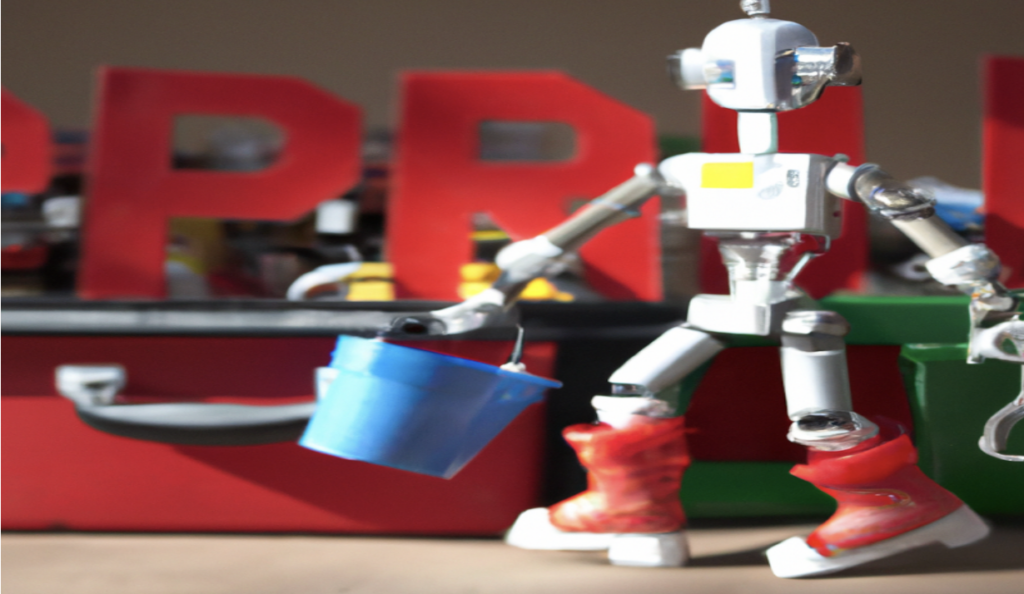There has been a lot of chatter about OpenAI’s natural language ChatGPT AI and other artificial intelligence technologies coming out of big tech companies like OpenAI, Google, and Baidu. Many people have been quick to reference movies like “The Terminator” or say that ChatGPT will be the end of “X,” where “X” is any industry or job that requires constant writing. Do not worry. ChatGPT and the other natural language AI platforms are not going to replace you or your PR firm; they will, however, be found in most of the new PR tools we will be using in a few short years.
I have been testing out ChatGPT since its release late last year. I started out giving it the same assignments I give to my public relations students at Emerson College. These assignments are highly reflective of the mission-critical tasks agencies assign to entry-level publicists in the real world. The results of ChatGPT’s performance ranged from a B to an F, and some of this work was covered by FOX News and Boston.com.
For an assignment to build a media list for reporters who cover Apple, ChatGPT spit back:
- Mark Gurman, Senior Correspondent at Bloomberg News, who is known for his extensive reporting on Apple’s product pipeline and company strategy.
- Jonny Evans, Apple commentator and journalist, who writes for Computerworld, Apple Must and AppleInsider.
- Ina Fried, Senior Editor at Axios, who covers technology and business, with a focus on Apple.
- Stephen Nellis, reporter at Reuters, who covers technology and has reported extensively on Apple.
- Jim Dalrymple, Editor-in-Chief of The Loop, an Apple-focused news and opinion website.
- Lauren Goode, Senior Writer at Wired, who covers technology and has written numerous articles about Apple and its products.
- John Paczkowski, Senior Reporter at BuzzFeed News, who has covered Apple for many years and is known for his in-depth reporting on the company.
This submission would get an “F” in my PR class (and at BIG FISH PR) as it is not a comprehensive list, nor is there contact information for any one of these reporters. Typically, my students use a combination of Muck Rack, Cision, and good old-fashioned research to identify the correct journalists and their respective contact information. So ACs (account coordinators) and AAMs (assistant account managers) can breathe easy; ChatGPT will not be replacing you yet.
For longer-form written work like drafting a press release, ChatGPT performed better and received a “C.” AP style combined with skilled release drafting seems out of reach of ChatGPT, so once again publicists can show up to the office on Monday.
Crafting short, punchy pitches is where ChatGPT performed best and earned a B. This one skill will not replace a publicist, but it could be a really useful tool for certain publicists who struggle with pitch writing, are burnt out, or simply have so much work piled on them that they simply do not have time to develop a pitch on their own. Now, I’m not saying publicists should rely on an AI platform that received a B on pitch writing from an Emerson professor, but it might be interesting to consider reading pitches that have not yet been thought through.
All this testing and grading of real-world PR tasks assigned to an AI got me thinking about the implications for the public relations industry. I have no fear that AI will automate publicity jobs and make our role in corporate communication redundant. I do, however, expect there to be more gradual and subtle impacts, and they will be felt most in the tools and processes we use to do our jobs every day as PR professionals.
There is no doubt that AI technologies like ChatGPT, which use natural language processing, can help PR professionals analyze large amounts of data, better understand consumer behavior and public opinion, and improve basic communication tasks in real time. By automating some tasks and giving PR professionals real-time insights, AI systems like ChatGPT have the potential to free up publicists from some time-consuming PR activities, enabling them to work on higher-level strategic projects.
Another important area where AI can have an impact is in the measurement of PR efforts. AI-powered analytics tools can give a lot of information about how well PR campaigns are doing, including metrics like reach and engagement. This information can be used to improve PR strategies and make PR campaigns work better as a whole.
All of this being said, there is one area where ChatGPT can have a rapid and significant impact and either replace or add to the role of a publicist: generating high volumes of SEO-focused blog posts quickly. ChatGPT can be easily used to create high (enough) quality relevant blog and social content optimized for search engines and social media platforms. This can help PR pros reach their target audiences better, but it can also replace them if their sole business role is simply to create web or blog content to keep up SEO visibility.
As a whole, AI technologies like ChatGPT are not coming for PR agency jobs or to replace PR professionals. Rather, I expect AI to be integrated into the PR tools and processes that publicists use every day. AI can help publicists do their jobs better by automating some tasks and giving them better information in real time. PR professionals should look at AI systems as tools that can potentially help them do their jobs better and faster. It is important to note that while AI does present a lot of opportunities for efficiency, it is not a replacement for human creativity and judgment, which are at the core of so much of what we do as PR professionals and how we counsel the brands we represent.
